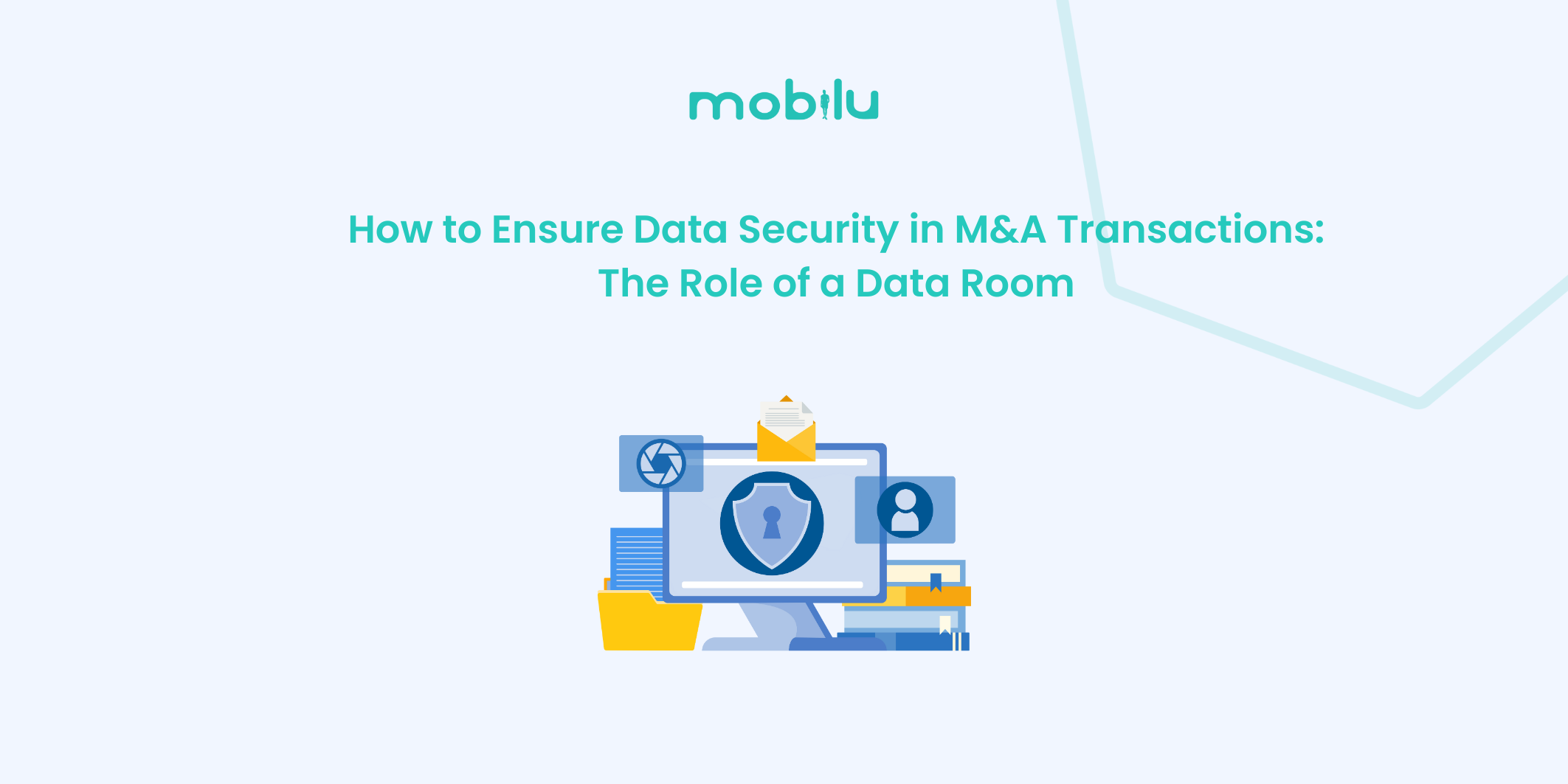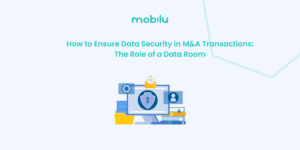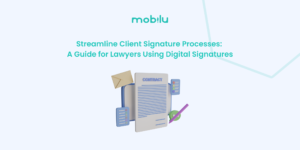How to Ensure Data Security in M&A Transactions: The Role of a Data Room
Have you considered the volume of sensitive data exchanged during a merger or acquisition? During high-stakes M&A transactions, confidential information will always bounce back and forth. Accordingly, safeguarding this data should be a major priority.
M&A transactions have a very slim margin of error regarding data security. One breach will have severe consequences. That’s why you should read this article to the end if you want to ensure data security in mergers and acquisitions.
This blog will help clarify M&A complexity and the pivotal role of data rooms. Here, we’ll dissect how these secure virtual environments revolutionize mergers and acquisitions. So, read on if you’re a seasoned investor, a corporate executive, or a financial advisor.
It’s time you fully understood the importance of data rooms in M&A transactions in ensuring data security in today’s digitized business world.
M&A Transactions and Who Performs Them
M&A (Mergers and Acquisitions) are corporate transactions where the ownership of companies, other business organizations, or their operating units are transferred or combined. Mergers involve the combination of two companies to form a new entity, while acquisitions involve the purchase of one company by another. With acquisitions, you don’t form a new company, whereas a merger requires you to make a new one.
Organizations and people carry out M&A transactions to meet several objectives. Some of the most common include the following:
- Growing in size
- Expanding into new territories
- Gaining market share
- Augmenting portfolio offerings
- Achieving synergies.
Mergers and acquisitions happen all the time. In 2022 alone, there were over 49,622 M&As reported. As more of these transactions happen, companies should prioritize data security. As data breaches and leaks increase, you want to ensure that your new venture starts on a strong note and avoid the headaches and challenges that security threats might bring.
What Are Virtual Data Rooms?
So what are virtual data rooms? They’re secure online spaces where businesses can store and share important documents during deals. Mergers and acquisitions (M&A) are some of the most common deals that can benefit from a solution like this.
Virtual data rooms have become a preferred alternative to the old-fashioned physical data rooms. Offline and on-site versions can be inconvenient, especially with multi-location M&As. They’re also less secure. With virtual spaces, companies can control who sees what information and keep track of all activity.
This is crucial during an M&A transaction’s due diligence process. This is especially crucial when potential buyers or investors deal with large volumes of sensitive data. Data rooms help manage access to various documents. Tiered access helps keep confidential information protected throughout the deal-making process.
Why Your Business Needs a Virtual Data Room During M&A Transactions
Your business needs a virtual data room (VDR) because it provides a secure and efficient way to handle sensitive information during critical business processes like mergers and acquisitions (M&A), fundraising, legal proceedings, or any situation where confidential data needs to be shared.
Here are key reasons why a VDR is essential for your business:
- VDRs offer advanced security features that protect sensitive information from unauthorized access, leaks, or cyber threats.
- Unlike physical data rooms, they allow authorized parties to access documents anytime and from anywhere.
- VDRs eliminate the need for physical space and reduce the costs associated with printing, copying, and securely moving large volumes of documents.
- They streamline the due diligence process by allowing for quick search and retrieval of documents, efficient document organization, and easy engagement monitoring.
- You can control who has access to what information and for how long, and you can revoke access when it’s no longer needed.
- They help ensure that your business complies with regulations related to the handling and sharing of data.
Data Room Features and How They Ensure Data Security in M&A Transactions
In M&A transactions, where the stakes are high and the information is sensitive, data rooms are indispensable for ensuring data security. Here’s a rundown of essential data room features and how they contribute to secure M&A activities:
1. Access Control
Data rooms allow administrators to set permissions at granular levels, controlling who can view, edit, or download documents. Access can be tailored to the individual’s role in the transaction, ensuring that each participant only sees what they need to see. One virtual data room example, Mobilu, established a secure and unique online presence that will identify one’s identity and provide access based on your authorization level.
2. Document Encryption
Files stored and shared within a data room are encrypted, which means they’re converted into a code that can only be deciphered with the correct key. This prevents unauthorized users from intercepting or accessing the data.
3. Audit Logs
Virtual data room providers often keep detailed logs of all user activity. This includes who has accessed which documents, what actions they took, and when. These logs are crucial for monitoring the transaction, detecting unusual activity, and maintaining a record for compliance purposes.
4. Watermarking
To deter sensitive information leaks, data rooms can automatically add watermarks to documents. These might include the user’s name, IP address, date, and access time. These make tracing data mishandling easier and let you make adjustments to amend and correct those vulnerable practices.
5. Two-Factor Authentication (2FA)
2FA adds an extra layer of security by requiring users to provide two forms of identification before accessing the data room. Typically, this is a password and a code sent to a mobile device. 2FA is one of the best ways to add reliable layers of security as they tend to block 100% of automated bots, 96% of phishing attacks, and 76% of targeted attacks.
6. Secure Viewing
Data rooms often provide secure document viewers that allow users to read files without downloading them. This keeps the documents within the secure perimeter of the data room.
7. Data Retention and Deletion Policies
Virtual data rooms stay compliant with legal and regulatory standards. That way, you have secure data retention during the necessary period. This also provides secure deletion methods when you no longer need the data.
Tips When Choosing a Data Room for M&A Transactions
When selecting a data room for M&A transactions, it’s crucial to make an informed decision that ensures security, efficiency, and ease of use. Here are some tips to consider:
Security Standards
Choose a data room that offers robust security measures, including data encryption, secure data centers, and compliance with international security standards such as ISO 27001. To understand these standards more, you might consider picking up a cybersecurity degree. But how much is a cyber security degree? A program could go between $44,700 to $46,000.
Access Control Features
The best virtual data room will give you access control features as a bare minimum capability. Look for a data room with detailed permission settings to control who can view, print, or download documents.
Comprehensive Audit Trails
Ensure that the data room logs detailed user activity. This will be invaluable for monitoring due diligence progress and legal protection in a dispute.
Vendor Reputation and Experience
Select a provider with a proven track record in M&A transactions. Experienced vendors understand the complexities of the process and offer the features and support necessary to navigate it successfully.
Customer Support
Choose a vendor that offers reliable, 24/7 customer support to address any technical issues promptly, ensuring the M&A process continues smoothly without interruption.
Due Diligence Tools
Look for data rooms with built-in tools to streamline due diligence, such as search functions, document tagging, and Q&A sections for addressing queries.
Trial Period
If possible, opt for a data room provider that offers a trial period. This allows you to test the platform’s functionality and ensure it meets your specific M&A needs before committing to paying the virtual data room cost.
Final Thoughts
The right data room protects the integrity of the entire M&A process. Moreover, it underpins negotiations and ultimately contributes to the successful culmination of the deal. That said, you want to make sure you’re choosing the right data room in M&A transactions and maximize it. Your data room choice will become an asset you’ll be happy you acquired along with the new companies in your portfolio.






